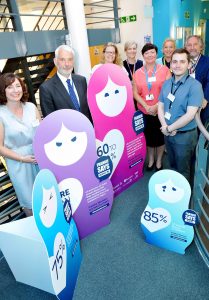Dedicated counselling service for victims of child sexual abuse
Police and Crime Commissioner Michael Lane launches new dedicated counselling service for victims of child sexual abuse
Frankie Workers aim to prevent trauma developing into poor mental health
Michael Lane, Police and Crime Commissioner, has joined forces with Clinical Commissioning Groups across Hampshire and the Isle of Wight to fund a new dedicated counselling service for victims of child sexual abuse, child sexual exploitation, and female genital mutilation (FGM) . Frankie Workers aim to prevent trauma developing into poor mental health.
The service, called Frankie Workers, is inspired by Frankie, an adult survivor of child sexual abuse who is now in her early 20s. Frankie was considered a happy child, ‘gifted and talented’ until being sexually abused at a young age and over a number of years by a family friend. Frankie says she was not offered trauma support and was eventually sectioned under the Mental Health Act. Frankie believes that had her trauma been dealt with, she would have coped and recovered better.
For the next three years, the Police and Crime commissioner is putting £100,000 a year into the service, with clinical commissioning groups contributing £117,406 per year. The Hampshire Frankie Workers will be provided by YPI Counselling, a Basingstoke-based charity specialising in counselling for young people, and work closely with Hampshire County Council’s children’s services. The Isle of Wight Frankie Workers will be provided by children’s charity Barnardo’s.
Police and Crime Commissioner Michael Lane said: “The Frankie Worker scheme is an innovative joint venture. It addresses the strategic threat of child sexual exploitation, and it cares for the most vulnerable victims and survivors of crime within our communities. We owe it to these children to ensure they get the best possible continuous support, where they live and when they most need it, and the Frankie Workers aim to deliver exactly that.
“It is also an inspiring example of partnership working beyond policing to keep us all safer and to empower people to realise their life opportunities, including helping victims and survivors on their journey of recovery and enabling them to experience a better and more hopeful future.”
Tony Capon, Chief Executive of YPI Counselling, said: “We are thrilled to be part of such an innovative project, one which addresses such a significant need across the county. By offering early intervention to such vulnerable young people, we will ensure that all those accessing the service are offered the opportunity to develop the key skills and strategies they need to look after their mental well-being right through into adulthood.”
Rachel McKernan, Assistant Director of Children’s Services at Barnardo’s said: “We welcome the opportunity to provide this vital service across the Isle of Wight. The impact on young people who have experienced abuse or exploitation can be traumatic and long-term. With the right help and support given by our Frankie Workers, we hope they can start to rebuild their lives and give them a brighter and more positive future.”
Dr Jane Dempster is Clinical Director for Safeguarding at NHS North East Hampshire and Farnham Clinical Commissioning Group, which hosts the Hampshire Children and Maternity Services Commissioning Team. She said: “For a victim of these forms of abuse the long-term mental health impact can be as bad, often worse, than the physical harm caused.
“We need to ensure that people who have been through such trauma are provided with a dedicated, compassionate and caring service that meets their needs when they are at their most vulnerable and which helps them to begin the journey back to health.”
Dr Dempster continued: “Frankie Workers are an important part of that and we are happy to be part of the partnership that has brought about this development.”
Evidence shows that more than half of adult survivors of child sexual abuse feel they needed more counselling than was offered to them, and that often waiting lists are too long, counselling is too short, and provision is inadequate. Research also showed that 75% of mental health problems are evidenced by the age of 21, but that 75% of young people’s disorders are not detected or treated appropriately at an early age.

Launch of Frankie Worker Service -(2nd left) Michael Lane, Police and Crime Commissioner for Hampshire, has joined forces with Clinical Commissioning Groups across Hampshire and the Isle of Wight to fund a dedicated counselling service for child victims of sexual abuse.
The Orchard, Basingstoke Voluntary Action, White Hart Lane,
Photography by Sarah Gaunt, taken 6th July 2017

